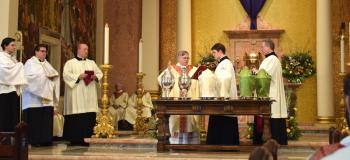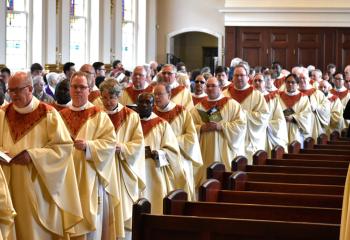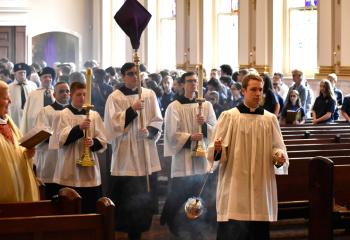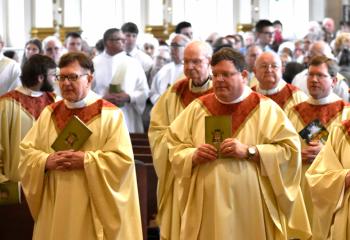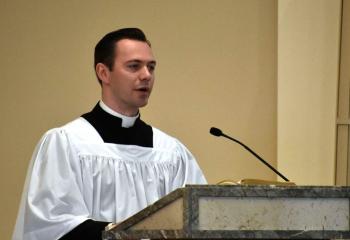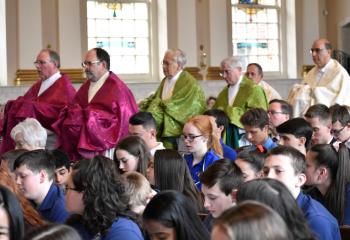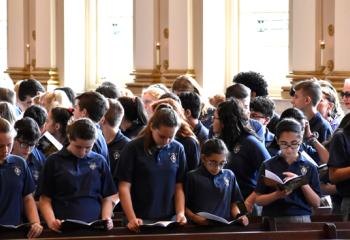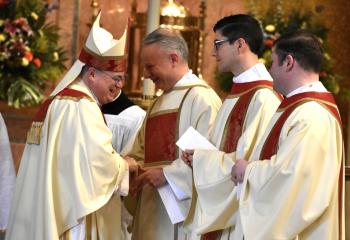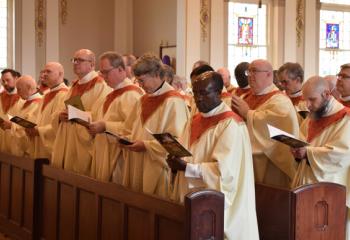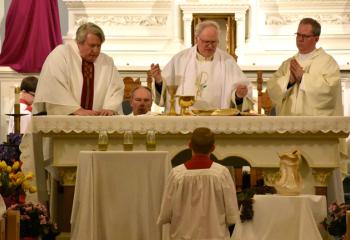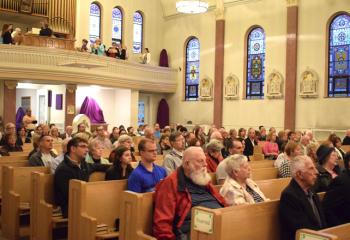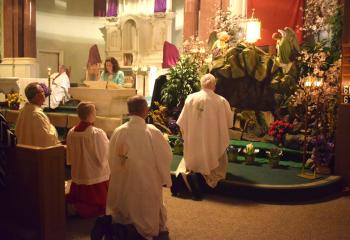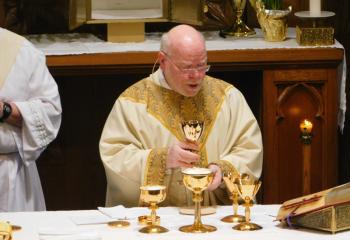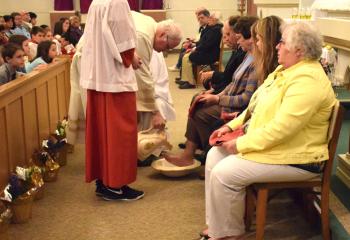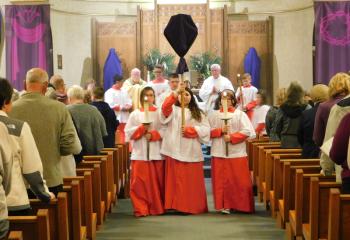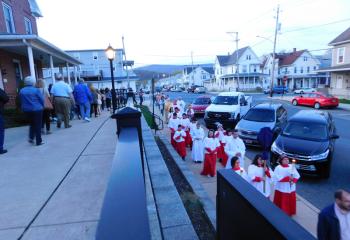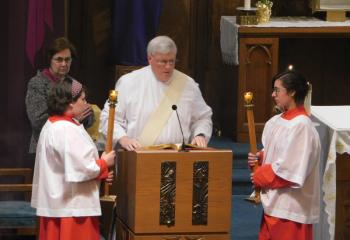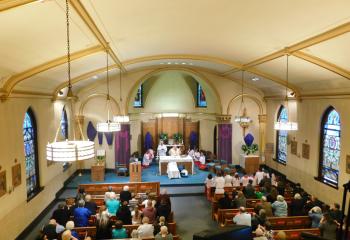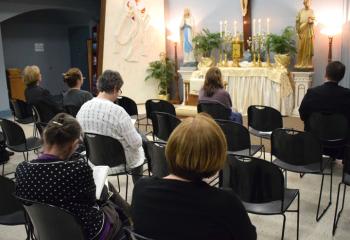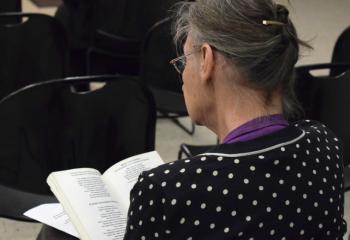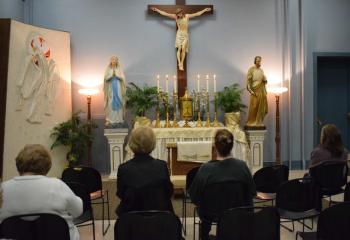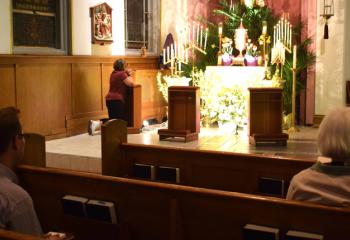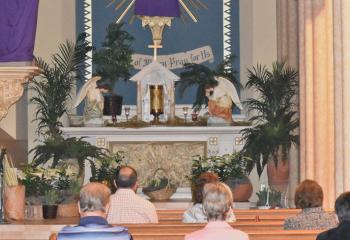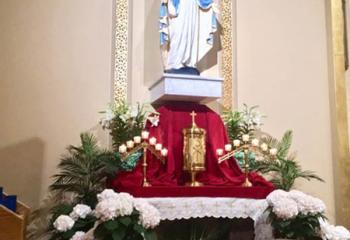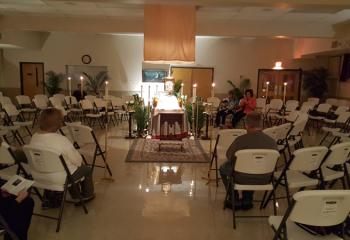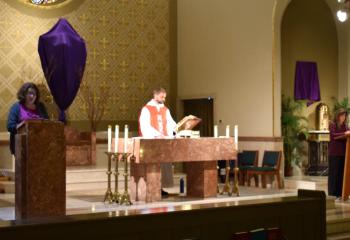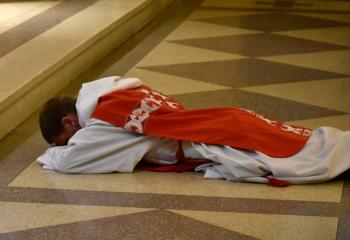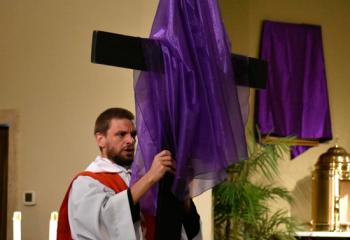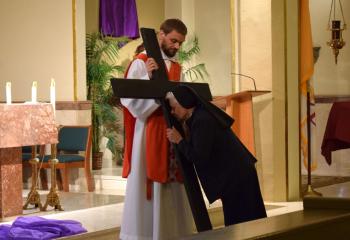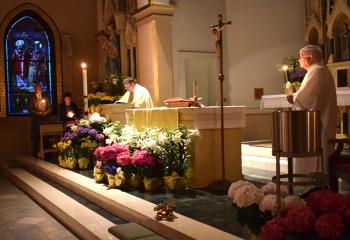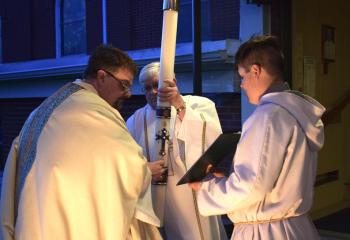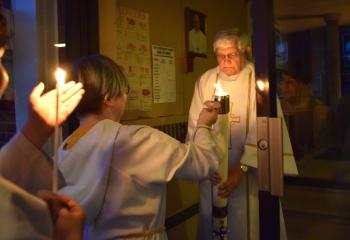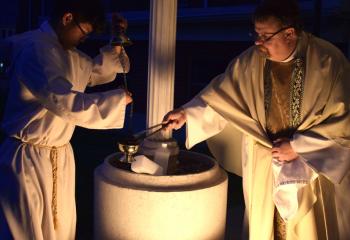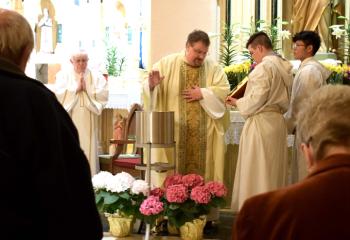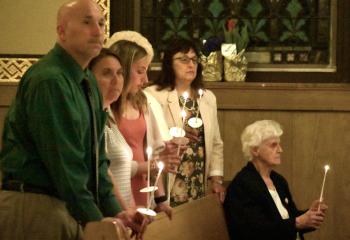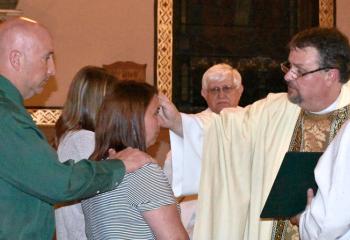The following is Bishop of Allentown Alfred Schlert’s homily from the Chrism Mass celebrated April 17.
We come together today, as every year, to commemorate the ancient tradition of blessing the Oils and consecrating the Chrism that will be brought to our parishes and used in the coming year. These sacred oils will be used to celebrate the Sacraments in the life of our Diocese and of our parishes.
The Oil of Catechumens will be used to prepare for a life of grace those desirous of cleansing Baptism.
The Oil of the Sick will strengthen those who are infirm and those preparing for the end of their earthly pilgrimage.
The Sacred Chrism will joyfully be used to crown the newly baptized as priests, prophets and kings; seal with the Holy Spirit those who are confirmed; and consecrate the hands of those men who, as priests, will offer the Eucharistic sacrifice and absolve sinners in the person of Christ.
It is a great joy for me to be here with my brother priests who today recommit themselves to the promises they made at their Ordination to the Priesthood. Welcome also to our Permanent Deacons, Seminarians, Religious and Laity from throughout the Diocese. Thank you for sharing this day with our beloved priests.
In a special way, I welcome Bishop Edward Cullen, the Third Bishop of Allentown, who is an Episcopal Jubilarian, celebrating 25 years of Episcopal Ordination.
I wish to acknowledge our Priest Jubilarians who are celebrating significant anniversaries this year.
As is our tradition, we also remember at this Mass our Priests and Deacons who have died this year.
Since we last came together for the Chrism Mass, our Diocese and indeed the entire Church has continued to be deeply wounded by clergy abuse and the lack of confidence in leadership that results from it. In many ways, it may appear that we have been living like the people of Paris who watched the roof of their beloved Cathedral of Notre Dame collapse in on itself. At times this year, it may have seemed that our beloved Church was collapsing in on itself, under the weight of sin and scandal.
But, just as the French vow to rebuild, so do we vow – starting with me – to rebuild the trust of the faithful that has understandably been shaken.
I thank my brother priests who courageously and faithfully live their priestly vocations with fidelity and dignity. Your work every day quietly restores the trust that our people expect of us.
To our seminarians, I say that our future credibility relies on your willingness to conform yourselves to Christ, to commit to holiness of life and to serve our people sacrificially. You are men of valor for discerning a vocation to the Priesthood in a climate that is so skeptical of your intentions for doing so.
In time of war, young men step forward to serve their country. We are in a time of spiritual warfare when the power of Satan is clearly visible. To the young men here today who may feel called to the Priesthood I say: the Church needs you now to step forward and join the battle.
We cannot forget the many efforts we have made since 2002 and continue to make as a Diocese to protect our youth and to heal the wounds resulting from the scandal. We are doing our best to reach out in many ways to victim-survivors and their families to offer pathways to healing.
The “Healing Our Church” program seeks to address the need for healing among our parishioners who are also greatly affected by the scandals. Thank you to the Pastors who invited this program into your parishes. Many, many parishioners have expressed to me that they are so grateful you supported this effort.
My brother priests, we too need healing from the effects of clergy abuse. As your Bishop, I pledge to assist you in any way I can to affirm your good work and to assist you in healing.
One of the things I would propose to bolster us at this time in our ministry is to remain stalwart in our preaching and teaching. This can only be done through a life of daily prayer and reflection.
In today's Gospel from Luke, chosen by the Church especially for us, we see Jesus confidently proclaiming that the “Scripture passage is fulfilled in your hearing.” The Gospel of Mark reminds us that the people were astonished because
“He taught them as one who had authority” (Mark 1:22). More than ever, the Church’s teachings need to be presented by us, boldly and without equivocation.
Many will say the Church does not deserve a moral voice due to our past sins. All the more reason for us to proclaim these Truths, because they are based not on the merit or holiness of men, but on Christ Himself.
In his recent reflections on the abuse crisis, Pope Emeritus Benedict XVI said: “Today the accusation against God is, above all, about characterizing His Church as entirely bad, and thus dissuading us from it. The idea of a better Church, created by ourselves, is in fact a proposal of the devil, with which he wants to lead us away from the living God through a deceitful logic by which we are too easily duped.
“No, even today, the Church is not just made up of bad fish and weeds. The Church of God also exists today, and today it is the very instrument through which God saves us….”
The constant teaching of the Church, that is the Deposit of Faith – based on Scripture and Tradition – cannot be subject to popular correctness or convenience. Unequivocal and orthodox teaching and preaching, however, does not exclude engaging or welcoming even the intransigent.
The first three Spiritual Works of Mercy make that clear by enjoining us to: instruct those in error, counsel the doubtful and admonish the sinner.
These three presume engaging in a conversation in truth and in charity. True accompaniment must lead to the Eternal Truths of our Faith, with all the challenges that that Truth entails.
Since membership in the Church is never on our terms, but on Christ’s, both preacher and listener must have humility as their point of departure. On the part of us preachers, we must know the message is not ours to alter, either by addition or subtraction.
We must have the humility to preach an integral message of salvation, including difficult moral truths. And we must use the Holy Spirit’s gift of fortitude to withstand the criticisms that a secular and politicized world view will launch on us.
None of us, in the name of welcome or dialogue, can obfuscate or lessen the unchangeable Truth or lessen its demands.
For the listeners, humility is needed to receive the message in all its challenging discomfort. No one can claim a right, in the name of welcome, dialogue or status, to declare him or herself exempt from the teachings of the Church. The Church welcomes us as we are, but challenges us in humility to live in holiness, fully bathed in the Light of Christ.
In just a few moments, as priests, you will be asked to recommit yourself “to discharge faithfully the sacred office of teaching, following Christ the Head and Shepherd, not seeking any gain, but moved only by zeal for souls.”
Brothers, with the Blessed Mother as our Protectress, may we all embrace the beauty, responsibilities and sacrifices of the Priesthood with complete trust in Christ the High Priest, with holy confidence, with manly courage, and with a fatherly desire to protect our flock from all that would harm them.



